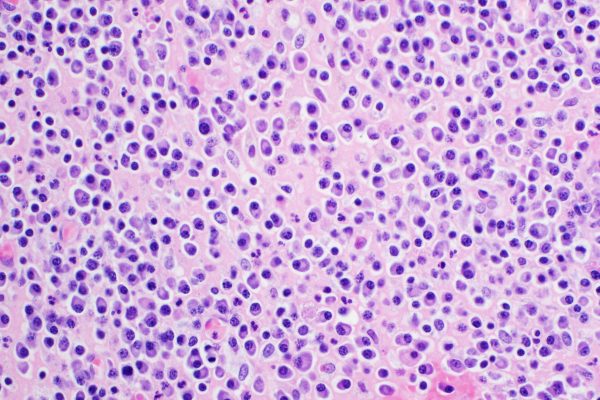
A correlation has been found between absolute lymphocyte count (ALC) and B-cell maturation antigen in multiple myeloma patients treated with CAR T-cell therapy. This was announced by a group of scientists who observed that patients from Weill Cornell Medicine, Columbia University Irving Medical Center, and Mount Sinai Hospital, USA, showed a better therapy response with an increase in ALC during the first 15 days of treatment.¹
Multiple myeloma is a malignant disease of plasma cells in the bone marrow that affects 700 new individuals each year in Belgium.² Although it is the second most common haematological malignancy and is associated with significant morbidity and mortality, no genetic component or definitive environmental risk factor is yet known. Nearly all patients with multiple myeloma experience a relapse, meaning that after an initially successful treatment, the cancer returns and necessitates additional therapy.³
The study published in Blood Advances investigated 156 patients with relapsed or refractory multiple myeloma receiving CAR T-cell infusion therapy with either ciltacabtagene autoleucel or idecabtagene vicleucel. Patients with an increase in ALC during the first 15 days of infusion showed a better response to treatment and improved progression-free survival compared to those with no such increase. Specifically, an ALCmax ≤0.5 × 10^3/μL was associated with worse outcomes, while an ALCmax >1.0 × 10^3/μL predicted deeper and more durable responses, highlighting an important association between therapy and improved prognosis following CAR T-lymphocyte expansion.¹
The study confirmed the correlation in the peripheral blood data of four patients, analysed through flow cytometry. Similar results were observed with both ciltacabtagene autoleucel and idecabtagene vicleucel. However, non-CAR-T lymphocytes also contributed to the ALC increase, and similar results were not observed in patients with non-Hodgkin lymphomas. This emphasises the need for further research to understand the role of different T-cell phenotypes.¹ A related study of 27 patients with relapsed/refractory multiple myeloma found better outcomes associated with higher CAR-T lymphocyte expansion, but only idecabtagene vicleucel was used.⁴
References